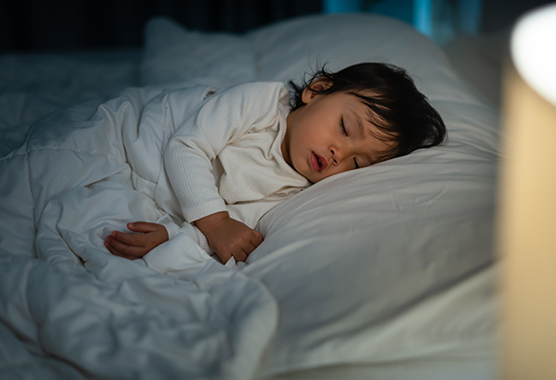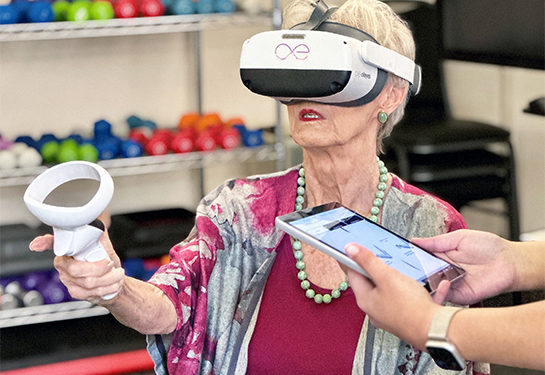Pediatric Sleep Disorders
Pediatric sleep disorders can interfere with a child’s well-being and adversely impact growth and development, but they are treatable. Our team specializes in the unique sleep needs of growing bodies.
Medically reviewed by Temitayo Oyegbile-Chidi, M.D. on June 17, 2025.

Specialists Trained to Help Treat Your Child’s Sleep Disorder
Our expert team includes experienced pediatric neurologists who are sleep medicine specialists focused on treating sleep conditions that affect a child’s daytime behavior, development, and school performance.
We offer advanced sleep studies and proven therapies designed for children’s needs. Our special training in these disorders means you receive a detailed diagnosis and a clear path forward so your child can perform their best at school and at home.
Types of Pediatric Sleep Disorders
Pediatric sleep disorders are conditions that interfere with your child’s quantity or quality of sleep. The most common sleep problems that affect children include:
- Delayed sleep phase syndrome
- Insomnia
- Narcolepsy
- Parasomnias
- Periodic limb movement disorders
- Restless legs syndrome
- Sleep apnea
Pediatric Sleep Disorder Symptoms
Some children’s sleep disorders cause mild symptoms, while others may be more severe. You might notice these symptoms when your child is awake, sleeping, or both.
Daytime Symptoms
Sometimes, symptoms of pediatric sleep disorders may appear in daytime behavior. Children may experience:
- Daytime sleepiness
- Hyperactivity or inattention
- Morning headaches
- Difficulty falling asleep
Nighttime Symptoms
Some sleep disorder symptoms only appear at night, and include:
- Bedwetting
- Night terrors
- Restlessness or excessive movement during sleep
- Sleepwalking or sleep talking
- Snoring or pauses in breathing during sleep
- Waking up during the night
Causes of Pediatric Sleep Disorders
Many different factors can cause children to develop a sleep disorder, including:
Blocked Airways
Asthma, allergies, obesity, or enlarged tonsils or adenoids may interfere with breathing during sleep.
Genetics
Some sleep disorders, such as restless legs syndrome and narcolepsy, can run in families.
Lack of Exercise
Not getting movement and exercise during the day can make it harder for children to fall and stay asleep.
Medications
Stimulants for ADHD, antidepressants, and some antihistamines can cause sleep disturbances in children.
Neurodevelopmental Disorders
Disorders that affect development, such as autism and Down’s syndrome, often adversely impact sleep. This can disrupt normal brain growth and development. Improving sleep in these disorders is imperative to optimize your child’s daytime behavior.
Diagnosis and Testing for Pediatric Sleep Disorders
We understand that sleep disorders can be stressful for you and your child. We start by discussing your child’s symptoms and medical history. Your child may also need specialized sleep testing, such as polysomnography (overnight sleep testing in a lab) or a home sleep study.
We make your child’s sleep study as comfortable as possible. Compassionate registered sleep technologists and respiratory therapists perform your child’s test, and you can stay in the room with your child throughout the test.
Our Sleep Disorders Laboratory is fully accredited by the American Academy of Sleep Medicine, which means you can be sure we meet the most rigorous standards. The result is excellent care for your child. Our experienced physicians evaluate the results and discuss them with you, helping you make an informed, confident decision.
Treatments for Pediatric Sleep Disorders
Your child is unique, so their sleep plan will be personalized for them. Our team focuses on your child’s personality, age, and lifestyle before recommending treatment, which may include:
Behavior Modification
Some children’s sleep disorders respond well to lifestyle changes. Sleep in children can be improved with behavioral therapy, including optimizing sleep behavior, bedtime routines, sleep environments, etc. Our team works with you to identify issues and improve your child’s sleep through modifications.
Medications
Medicine to treat asthma or allergies may improve your child’s sleep. If your child has iron deficiency and restless legs syndrome, we may recommend an iron supplement. Insomnia may require medication treatment. We work to ensure your child’s insomnia improves with minimal medication.
Surgery
Surgery may be helpful if enlarged tonsils or adenoids are blocking your child’s airway. Our team discusses this procedure with you so you can make an informed decision.
Continuous Positive Airway Pressure (CPAP)
A CPAP machine keeps airways open during sleep and can treat many cases of obstructive sleep apnea (OSA) in children.
Preventing Sleep Disorders By Developing Good Sleep Habits
You can’t always prevent sleep disorders in children. However, we can guide you through ways to help your child get healthy sleep. Some strategies include:
Calm Sleep Environment
Avoiding blue light for two hours before bed and creating a relaxing routine, such as a warm bath or shower right before bedtime, can help kids fall asleep.
Consistent Bedtime Schedule
Going to bed and waking up at the same time every day, including weekends, can improve children’s sleep.
Diet Changes
Caffeine and heavy meals in the evening can interfere with good-quality sleep.
Physical Activity
Regular exercise, such as walking or biking, improves sleep in people of all ages, including children and teens.
Who does it affect?
50%Of all children will experience a sleep problem.
Up to
60%Of kids and teens with obesity have sleep apnea.
Sources: American Family Physician: Common Sleep Disorders in Children
American Heart Association: Obstructive Sleep Apnea Is Common in Kids and May Impact Blood Pressure, Heart Health
Request an Appointment
As Sacramento's No. 1 hospital, you'll benefit from unique advantages in primary care and specialty care. This includes prevention, diagnosis and treatment options from experts in 150 specialties.
Referring Physicians
To refer a patient, submit an electronic referral form or call.
800-4-UCDAVIS
Patients
Call to make an appointment.
Consumer Resource Center
800-2-UCDAVIS

Ranked among the nation’s best hospitals
A U.S. News & World Report best hospital in cardiology, heart & vascular surgery, diabetes & endocrinology, ENT, geriatrics, neurology & neurosurgery, and pulmonology & lung surgery.

Ranked among the nation’s best children’s hospitals
U.S. News & World Report ranked UC Davis Children’s Hospital among the best in pediatric nephrology, orthopedics*, and pulmonology & lung surgery. (*Together with Shriners Children’s Northern California)

Ranked Sacramento’s #1 hospital
Ranked Sacramento’s #1 hospital by U.S. News, and high-performing in aortic valve surgery, back surgery (spinal fusion), COPD, colon cancer surgery, diabetes, gynecological cancer surgery, heart arrhythmia, heart failure, kidney failure, leukemia, lymphoma & myeloma, lung cancer surgery, pacemaker implantation, pneumonia, prostate cancer surgery, stroke, TAVR, cancer, orthopedics, gastroenterology & GI surgery, and urology.

The nation’s highest nursing honor
UC Davis Medical Center has received Magnet® recognition, the nation’s highest honor for nursing excellence.

World-class cancer care
One of ~59 U.S. cancer centers designated “comprehensive” by the National Cancer Institute.

A leader in health care equality
For the 13th consecutive year, UC Davis Medical Center has been recognized as an LGBTQ+ Healthcare Equality Leader by the educational arm of America’s largest civil rights organization.

